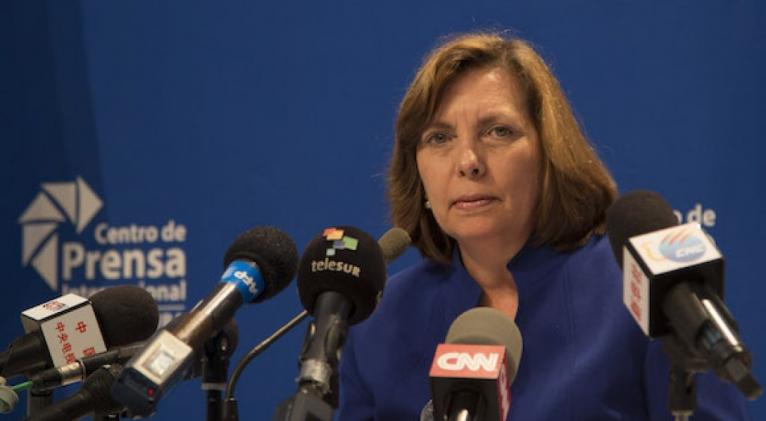Despite clear advances, embargo remains main obstacle for U.S.-Cuba ties

A year after the restoration of diplomatic ties between Cuba and the United States, the U.S. embargo remains the main obstacle to the full normalization of ties, say Cuba officials.
The current bilateral process represents an opportunity to solve outstanding problems for the first time and brings benefits to Cuba and its development, said Josefina Vidal, head of the U.S. Section at Cuban Ministry of Foreign Affairs.
"We have worked for many years to successfully change U.S. policy toward Cuba," said Vidal in an interview with Cuba's official daily Granma published Wednesday.
"Fidel (Castro) has, at different moments, expressed Cuba's willingness to discuss and resolve our differences with the U.S. in negotiations, without giving up on any of our principles," she said.
COMPLEX NORMALIZATION PROCESS UNDERWAY
"In the last 19 months, matters of great priority and interest to Cuba have been resolved, in the political and diplomatic sphere," said Vidal.
She highlighted several important results - the return of three Cuban agents imprisoned in the United States, the removal of Cuba from the U.S. list of states sponsoring terrorism and the creation of a bilateral commission to monitor relations between the two countries.
In the last year alone, Havana and Washington have signed ten cooperation agreements linked to fighting drug trafficking, law enforcement, search and rescue, meteorology, disaster prevention, and environmental protection.
Others are currently being negotiated and could be concluded before the end of the year.
"The U.S. and Cuba have made significant progress in different areas that will improve the lives of citizens of both countries," said Jeffrey DeLaurentis, Washington's Charge d' Affaires in Havana, in a joint interview with foreign correspondents on Tuesday.
"These changes try to stimulate commercial interaction in addition to expanding people-to-people travel. The whole notion of engagement and commercial contact is an important part of our relation but obviously within the confines of the law," he added.
The senior U.S. diplomat said both countries are focused on "moving forward" in all areas and making as much progress as possible in the remaining months of the Obama administration.
"We have a new course in U.S.-Cuba relations ... and we're trying to make as much progress as possible so the policy is viewed as in the best interests of the U.S. and irreversible," he added.
MORE COULD BE DONE IF EMBARGO LIFTED
While the embargo is still not lifted, measures touted by U.S. President Barack Obama have allowed American telecommunications and tourism companies to invest in Cuba.
"Much more could be done if this policy were eliminated," said Vidal, noting that banking relations particularly stand to benefit.
In order to normalize diplomatic relations, Havana demands the lifting of the embargo, the return of the U.S. naval base at Guantanamo, an end to the Cuban Adjustment Act, and the cessation of all activities encouraging subversion in the Caribbean country.
On the issue of Guantanamo, Vidal said that "this is the only case in the world of a military base being occupied in perpetuity and illegally, against the will of the government and the people of the country in which it is located."
"There has not been a single meeting in which we have not placed this fair demand on the table, just as for the blockade," said Vidal.
Vidal noted that financial transfers between the two countries remain blocked, services for Cuban diplomatic missions around the world are denied, and international banks working with Cuba are fined.
"There is still intimidation on American and global banks due to the 49 fines imposed by the government of President Obama on ...entities that have legitimate relations with Cuba," explained Vidal.
CUBA'S PRINCIPLES UNWAVERING
Despite these considerable challenges, Vidal said that "in the current stage, unprecedented bilateral interaction exists alongside the policies of the past, which tells us ...that the process toward normalization of ties with the U.S. will be long and complex. But we will persevere as we have always done."
Vidal made it clear that relations with the United States "have always been marked by the contradiction of Washington's will to dominate the island and the determination of Cubans to be free and independent. This is not going to change."
Honoring the unwavering commitment of the Cuban government to its principles, Vidal noted that while "Cuba has never been anti-American, it is and will continue to be deeply anti-imperialist."
"The fact that we are trying to build a new type of relationship with the U.S. in no way implies that Cuba is giving up its foreign policy linked to fairness in the world, the right to self-determination by all people and help to brother countries," Vidal said.













Add new comment